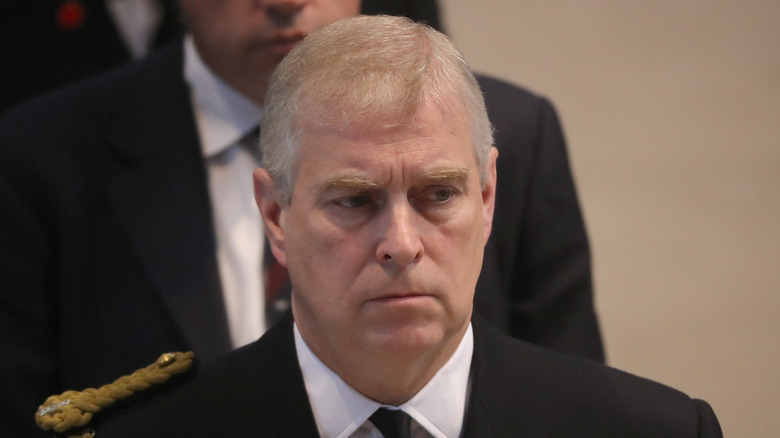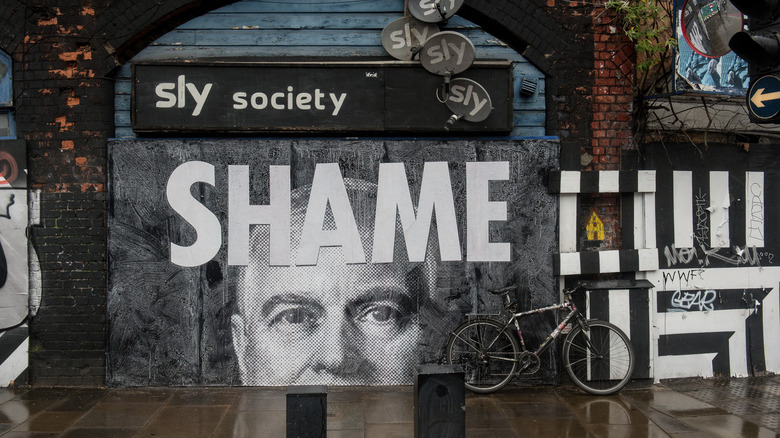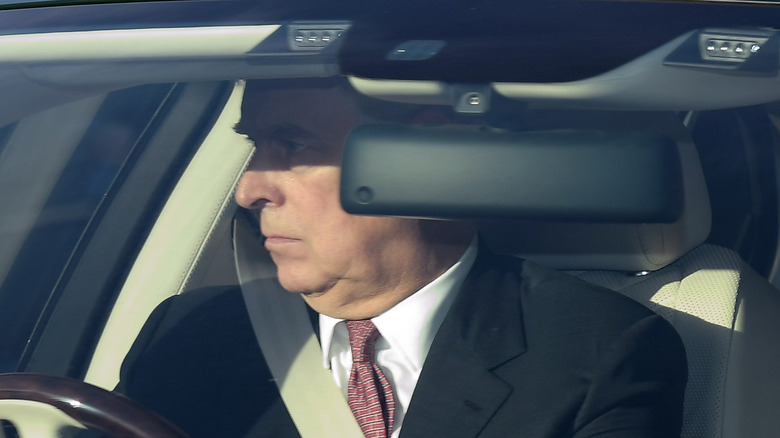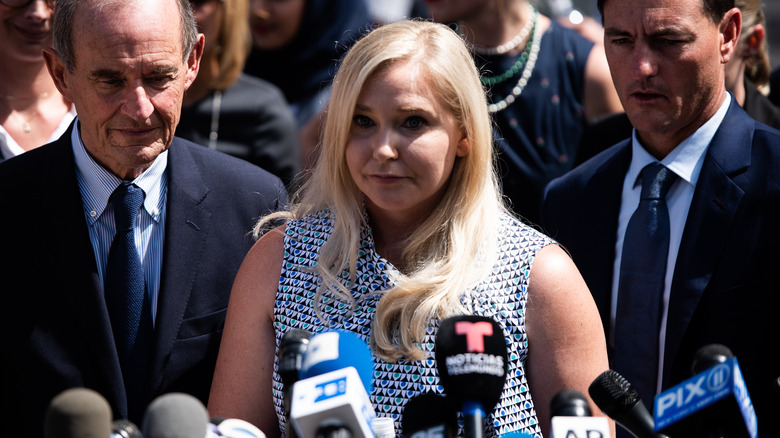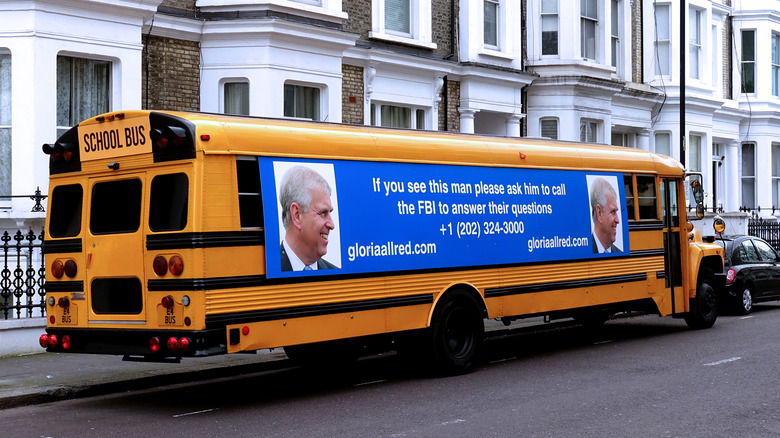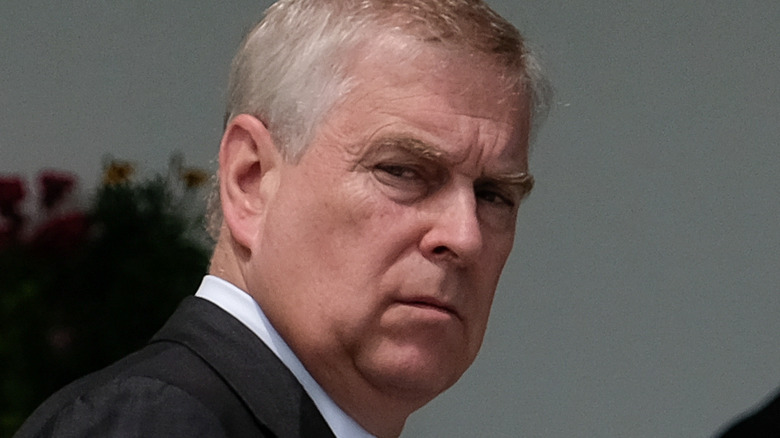How Prince Andrew's Life Changed After His Infamous BBC Newsnight Interview
On November 16, 2019, the BBC's flagship current affairs show "Newsnight" broadcast one of the most unprecedented and incendiary interviews of the century: A sit down with a major royal, Prince Andrew, Duke of York, who at the time was attempting to rebuild his brand after years of damaging headlines concerning his dealings with the deceased convicted pedophile Jeffrey Epstein, including accusations that he had sex with an underage woman trafficked to him by the disgraced financier. The interview was meant to help Andrew rehabilitate his image. Instead, it caused it to implode, catalyzing the utter destruction of the prince's public life.
Not that the prince would ever have expected this, even after the intense grilling from the BBC's Emily Maitlis, who confronted him for continuing to associate with a convicted sex offender and invited Andrew to address the allegations against him (all of which he denied). According to Maitlis herself, who features in A&E's upcoming "Secrets of Prince Andrew" two-part documentary, Andrew willingly stayed on set after his grilling by the "Newsnight" journalist, hobnobbing with the crew. Similarly, the prince's staff seemed certain that their man had made a good impression in front of the camera; according to "Newsnight' producer Samantha McAlister (via The Sun), one of the prince's cohort claimed the interview was "wonderful ... wasn't he wonderful?" Andrew's team couldn't have anticipated the true public response.
An immediate backlash
Prince Andrew's BBC "Newsnight" interview received an instantaneous backlash from the press across the political spectrum, with many commentators ridiculing Andrew's weak justifications for his continued friendship with Jeffrey Epstein. As many critics pointed out, Andrew's failure to truly apologize for his abhorrent involvement with a sex criminal smacked of privilege and entitlement, and presented the prince as a self-important man sorely lacking in self-awareness, who seemingly believed that his royal background put him beyond reproach. The interview caused widespread revulsion in the U.K. and beyond.
But more scandalous was the prince's claim that he could not recall meeting Virginia Giuffre, an Australian-American woman who alleges that in 2001 she was trafficked by Epstein and forced to have sex with Andrew when she was just 17, The Guardian reported. Though a photograph of the two together — with Epstein's fixer Ghislaine Maxwell in the background — had already circulated widely in the newspapers, Andrew denied ever having met Giuffre and suggested that the photograph was a forgery.
Most bizarre of all, however, was Andrew's attempt to rebut Giuffre's recollections of dancing with the prince at London's Tramp nightclub. Giuffre had described Andrew as sweating profusely while the two of them were on the dancefloor. But the prince attempted to undermine her recollection by claiming that he has a "medical condition" that prevents him from sweating — the result of an overdose of adrenaline while serving in the British Royal Navy during the Falklands War, The Irish Times reported. The claim sparked derision in both the mainstream media and online, with internet users and experts alike ridiculing the claim. In the aftermath, one British punk band released a hit song titled "Prince Andrew is a Sweaty Nonce."
Andrew stepped back from the royal family
On November 20, 2019, just four days after Prince Andrew's fateful "Newsnight" interview was broadcast by the BBC, it was announced that Queen Elizabeth II's second son would be stepping back from royal duties with immediate effect, as the royal family scrambled to ensure the monarchy survived the media onslaught the interview had triggered.
In a statement credited to "His Royal Highness The Duke of York KG" posted to the royal family's Twitter account, Andrew notes that "the circumstances relating to my former association to Jeffrey Epstein has become a major disruption" to the royal family and beyond was the reason for giving up his public duties.
Of course, stepping out of the public eye was likely not Andrew's own decision. As noted in "Secrets of Prince Andrew," the Duke of York had maintained the habit of listening to his mother's direction throughout his life — so much so that many commentators were baffled how his disastrous interview was allowed to go ahead. It was likely the queen, as the head of "the Firm," who made the executive decision to distance her son from the rest of the royal family. The statement also made clear that Andrew was standing back from many of the charities and other organizations with which he had been associated.
He avoided trial with a settlement
Prince Andrew's attempts to discredit alleged sex trafficking victim Virginia Giuffre during his November 2019 "Newsnight" interview well and truly backfired. In fact, the interview precipitated the escalation of legal efforts by Giuffre's camp against the prince.
Andrew claimed that he had no recollection of Giuffre, and even came up with an alibi for the night she alleged the two had been dancing together in Tramp nightclub. He told the BBC's Emily Maitlis that he had taken his daughter, Beatrice, for a birthday party at a branch of Pizza Express in Woking, a town in Surrey, and otherwise was at home with his children. (Beatrice later said she did not recall such an event, per the Mirror). But in December 2021, Giuffre's team then announced that they were suing the prince, that they had a witness who could verify that Andrew and Giuffre were indeed at Tramp on the night in question, and requesting documents that could prove the Ppince's assertion that he had a medical condition that prevented him from sweating, The Guardian reported.
With Andrew's denials holding up to little scrutiny, the royal family faced the prospect of a senior royal being embroiled in a lengthy, headline-generating trial. So, unsurprisingly, they stepped in to ensure the scandal didn't so far as to expose them any further. In February 2022, it was announced that Prince Andrew and Virginia Giuffre had reached a settlement to ensure the case didn't go to court. Though the amount paid was never officially revealed, legal analysts told The Guardian that the royal family could potentially have paid out more than $10 million.
He has refused to cooperate with the FBI
In his final line of resignation statement announcing the termination of his royal duties, Prince Andrew claimed that as well as being contrite for his association with known pedophile Jeffrey Epstein, he was "willing to help any appropriate law enforcement agency with their investigations, if required." But as Andrew's reported longtime refusal to accept being served papers in the Virginia Giuffre case suggests, the Duke of York has proven less willing to actually play ball than he might claim, Reuters reported.
For most people, when the FBI comes calling, you'd feel the need to play along. Not Prince Andrew, who, since the interview, has reportedly been evading calls to work with a U.S. federal investigation and answer questions related to his friendship with the notorious pedophile Jeffrey Epstein — an inquiry which is still ongoing as the scale of the financier's sex trafficking crimes continue to come to light. Andrew's evasion has drawn both ridicule and anger, with the celebrity lawyer Gloria Allred commissioning a school bus with hoardings featuring Andrew's picture along with the words (via The Guardian): "If you see this man please ask him to call the FBI to answer their questions[,]" along with the FBI's telephone number.
He has been stripped of royal privileges
While Prince Andrew ultimately evaded having to go to trial in the Virginia Giuffre civil case, the legal challenge cost him deeply, and not just financially. The month after the December 2021 conviction of Jeffrey Epstein's associate Ghislaine Maxwell for sex trafficking, the royal family announced that the prince would no longer be able to use his royal titles — most notably the title "His Royal Highness" — in any official capacity. "The Duke of York will continue not to undertake any public duties and is defending [the Giuffre] case as a private citizen," the statement read, explicitly attempting to distance the crown from the scandal.
The move came after the queen came under pressure from veterans of the British military to strip Andrew of his many military awards and titles, including that of vice admiral of the Royal Navy. As a result, the statement also made clear that these titles had been returned to the queen, and that Andrew was no longer a member of the military. However, he retained his title of Duke of York, which was given to him on his wedding day in 1986.
Since then, Andrew's alienation from the royal family has grown even starker. In January 2023, it was widely reported that the disgraced royal had been told by his brother, the soon-to-be-coronated King Charles III, that he was no longer welcome to live in Buckingham Palace. And though he continues to have a home on the Windsor estate, there has been speculation he may be evicted from there too and have his financial support cut by the new king.
If you or anyone you know has been a victim of sexual assault, help is available. Visit the Rape, Abuse & Incest National Network website or contact RAINN's National Helpline at 1-800-656-HOPE (4673).
